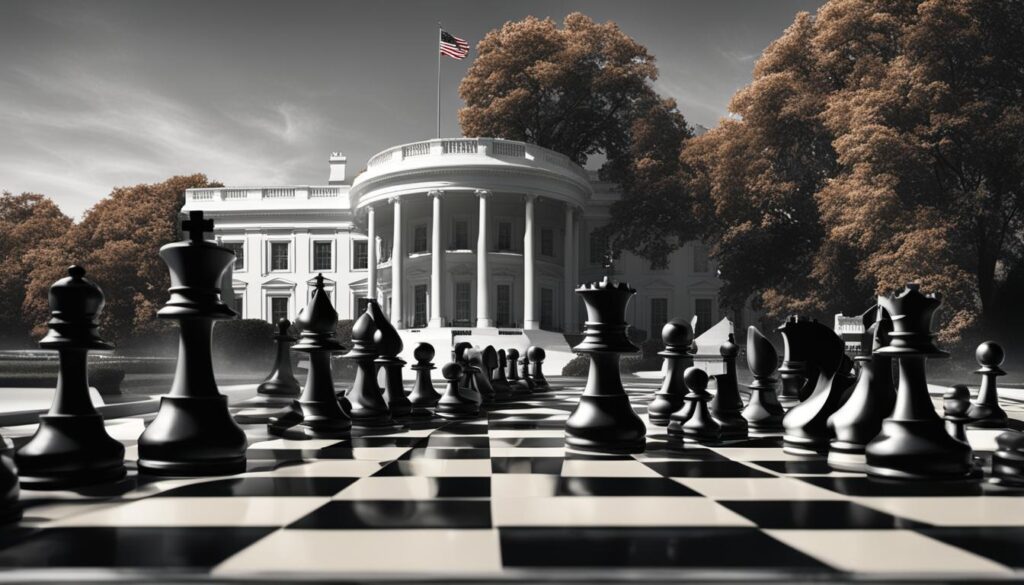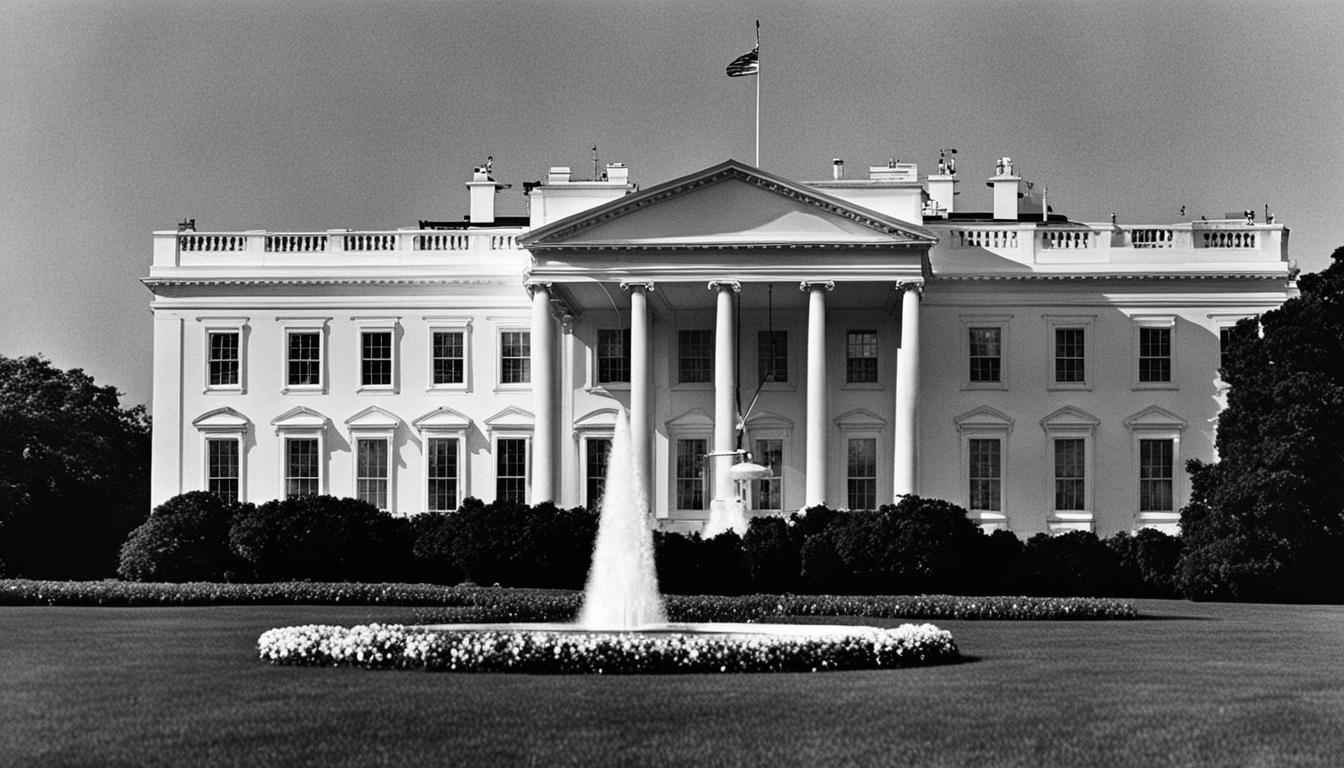“Reaching for Glory: Lyndon Johnson’s Secret White House Tapes 1964-65” is a captivating book by Michael R. Beschloss that offers readers a unique glimpse into the inner workings of Lyndon B. Johnson’s presidency. Drawing from the secret recordings made by Johnson in the White House between 1964 and 1965, Beschloss presents a comprehensive account of the power struggles, decisions, and challenges faced by Johnson during this pivotal period in American history.
The White House tapes provide an unprecedented level of insight into the thoughts, conversations, and emotions of Johnson and his administration. They offer a behind-the-scenes look at the major events and policies of the time, shedding light on the Vietnam War, Johnson’s political maneuvering, and his personal struggles.
This book is a must-read for anyone interested in delving deep into the complexities of the Johnson presidency and gaining a better understanding of the man behind the public image. It unveils the raw truth of the political landscape and showcases the human side of a president grappling with immense pressures and leading a nation through a tumultuous era.
Key Takeaways:
- Gain unprecedented access to Lyndon B. Johnson’s presidency through the secret White House tapes
- Uncover the power struggles, decisions, and challenges faced by Johnson during this crucial period
- Explore Johnson’s thoughts, conversations, and emotions surrounding major events and policies of the time
- Delve into the complexities of the Johnson presidency and the human side of a president under immense pressure
- Develop a deeper understanding of the inner workings of American politics during a tumultuous era
The Gulf of Tonkin Resolution and Vietnam War Strategy
During a conversation with Robert McNamara, Lyndon Johnson reflects on the Gulf of Tonkin Resolution and its implications for the Vietnam War. The initial intention behind the resolution was not to deploy a large number of ground troops to Vietnam. However, the situation has evolved, leading Johnson to question the United States’ ability to secure victory utilizing the existing resources and support.
The Gulf of Tonkin incident, which occurred in August 1964, played a pivotal role in escalating American involvement in the Vietnam War. The resolution passed by Congress provided the President with expansive powers to take military action. It was viewed as a direct response to perceived threats to U.S. forces in the region.
Despite the initial intent of limited involvement, Johnson finds himself grappling with the realities and complexities of the Vietnam War. He acknowledges the changing circumstances and the need to reassess the strategy to achieve a favorable outcome.
“I’m very worried about this country getting into a war that can be a dud. I’m afraid we’ll get a stalemate and not know how to get out.”
The conversation between Johnson and McNamara sheds light on the difficulties and uncertainties faced by the President in formulating a comprehensive strategy for the Vietnam War. The Gulf of Tonkin Resolution’s unintended consequences and the escalating commitment of resources underscore the challenges Johnson encountered in navigating the complex dynamics of the conflict.
| Gulf of Tonkin Resolution | Vietnam War Strategy | |
|---|---|---|
| Definition | A Congressional resolution passed in response to the Gulf of Tonkin incidents, granting expanded powers to the President to use military force in Vietnam. | The overall plan and approach employed by the United States in its military involvement in Vietnam. |
| Impact | Heightened American commitment to the Vietnam War, leading to an increased number of troops deployed and escalated military actions. | The strategy evolved over time as Johnson confronted challenges, uncertainties, and changing circumstances. |
| Objective | Initially intended to provide flexibility and defend U.S. interests in the region without committing significant ground forces. | Reevaluate and reassess the approach to achieve a favorable outcome given the evolving situation. |
| Challenges | Unintended consequences, uncertainties, and complexities of the conflict posed significant challenges for Johnson in formulating a successful strategy. | Resource constraints, doubts about the ability to win the war, and concerns regarding domestic support contributed to the complexity of decision-making. |
LBJ’s Deteriorating Mental State
Bill Moyers, a close aide to President Lyndon B. Johnson, became increasingly concerned about the President’s mental state during the decision-making process to escalate the Vietnam War. Moyers witnessed Johnson’s psychological and emotional deterioration firsthand, as the weight of the war started taking a toll on his mental health.
Moyers recounted Johnson’s bouts of depression, paranoia, and anguished contemplation of the detrimental effects the war would have on his presidency. The immense pressure and burden of leading the nation through such a divisive conflict took a devastating toll on Johnson’s well-being.
“I saw a side of LBJ that I had never witnessed before. The weight of the war seemed to consume him, leading to deep bouts of depression. He became increasingly paranoid, constantly questioning the loyalty of those around him. It was heartbreaking to see the toll it took on him.”
This account provides valuable insight into the internal struggles Johnson faced as he grappled with the weight of the Vietnam War and the immense responsibilities of his presidency. His declining mental state sheds light on the profound impact that the stress and pressures of the era had on his well-being.

| Effects of the Vietnam War on LBJ’s Mental State |
|---|
| Depression |
| Paranoia |
| Anguished contemplation of the war’s detrimental effects on his presidency |
Concerns about McGeorge Bundy and the Kennedys
During a recorded conversation, Lyndon B. Johnson expresses his annoyance with McGeorge Bundy, believing that he has been co-opted by the Kennedys. Johnson even contemplates accepting Bundy’s resignation, accusing him of being influenced by the Kennedy family. This conversation sheds light on Johnson’s complex relationship with members of the Kennedy administration and his suspicions about their loyalty and influence on his own staff.
Johnson’s annoyance with McGeorge Bundy and his concerns about the Kennedys reveal the tensions within his administration. As a successor to President John F. Kennedy, Johnson often felt a sense of unease and pressure to live up to the Kennedy legacy. The presence of former Kennedy advisors, such as Bundy, added to Johnson’s frustrations as he sought to establish his own leadership style and agenda.
“I just think it’s a fact that Jackie and Bobby and some of those folks have worked on Bundy. Hell, I’ve even talked to him about it…I waved a resignation for him to sign. I don’t know whether I will or not–I think I will. I’ll think it over.”
The Kennedy Influence
Throughout his presidency, Johnson found himself grappling with the shadow of the Kennedys. The lingering presence of the Kennedy family, combined with his own insecurities, contributed to his annoyance with individuals like McGeorge Bundy who had strong ties to the previous administration. The conversations captured on these secret White House tapes provide a glimpse into Johnson’s inner thoughts and frustrations as he sought to carve out his own path.
Johnson’s concerns about Bundy and the Kennedys reveal the complexities of power dynamics within the White House. As a leader, Johnson had to navigate his own ambitions, the expectations of the Kennedy loyalists, and the challenges of the Vietnam War. These conversations serve as a testament to the intricate web of relationships and influences that shaped Johnson’s presidency.
McNamara’s Proposals and Johnson’s Doubts
During a pivotal conversation, Robert McNamara presents three proposals to Lyndon B. Johnson regarding the future of American involvement in Vietnam.
These proposals encompass a range of options, from serious escalation to withdrawal and maintaining current force levels with more aggressive missions.
As McNamara outlines his ideas, Johnson’s doubts begin to surface. He expresses skepticism about the potential for a military victory in Vietnam and raises concerns about securing sufficient domestic support without further authority from Congress.
This conversation sheds light on Johnson’s apprehensions regarding the feasibility and consequences of different courses of action in Vietnam.
As he navigates the complexities of the war, Johnson grapples with the weighty decision of whether to commit ground troops or explore alternative strategies.
Ultimately, this dialogue exemplifies the immense challenges Johnson faced in formulating a cohesive plan and underscores his cautious approach to American involvement in Vietnam.
“Can we get by with what we have here, just some additional air units, engaging now in more aggressive air action?”
“Do we have to add more ground troops or withdraw?”
“Can we get enough domestic support for it, without further authority from Congress?”
– Lyndon B. Johnson
Military Victory vs. Political Realities
Johnson’s doubts reflect his recognition that a military victory in Vietnam may not be achievable, given the complexities of the conflict and the political realities at home.
His concerns about securing domestic support highlight the growing disillusionment and doubts among the American public regarding the Vietnam War.
Johnson’s cautious approach and hesitation to commit ground troops reveal a president grappling with the implications of escalating the conflict and the potential consequences for both the American military and the nation as a whole.
The Pros and Cons of Different Paths
McNamara’s proposals present Johnson with a range of options, each with its own advantages and drawbacks.
The option of serious escalation entails committing more ground troops and resources to the conflict. While this may demonstrate American strength and resolve, it also risks deeper entanglement and a higher casualty count.
On the other hand, withdrawal would bring an end to American involvement in Vietnam and potentially reduce casualties, but it could be seen as a failure and leave a power vacuum in the region.
The third proposal, maintaining current force levels with more aggressive missions, offers a middle ground between the other options. It allows for increased military action without committing additional ground troops, but it still presents the challenge of achieving a decisive victory.
A Delicate Balancing Act
Johnson’s doubts underscore the delicate balancing act he faced as he tried to navigate the complexities of the Vietnam War. He had to consider military objectives, political realities, and the toll that further escalation could have on both American troops and the nation.
His concerns about securing domestic support highlighted the growing division and skepticism among the American public regarding the war.
Ultimately, Johnson’s doubts and hesitations reveal the immense pressure and responsibility he carried as he sought to chart a course for American involvement in Vietnam.
Johnson’s Personal Privations
In various conversations, Lyndon Johnson’s personal struggles and vulnerabilities come to light, offering a glimpse into the toll the presidency took on his well-being. Johnson expresses his frustrations with health concerns, including stomach upsets and persistent coughing. He also acknowledges the diminishing physical condition of his older advisors, making it increasingly difficult for him to rely on their guidance. These intimate insights humanize Johnson and shed light on the personal sacrifices he endured during his time in office.
Johnson’s health concerns were a constant presence throughout his presidency, impacting both his physical and emotional well-being. Despite his dedication and determination to lead the nation, his personal privations became evident, reflecting the immense pressure and stress he faced on a daily basis. The toll of the presidency on Johnson’s health serves as a poignant reminder of the sacrifices individuals in positions of power often endure.
Johnson’s Political Maneuvering
In his secret White House tapes, Lyndon B. Johnson reveals his political acumen and skillful maneuvering in navigating relationships and managing political dynamics. Johnson candidly discusses his frustrations with advisors such as McGeorge Bundy and the Kennedys, expressing his concerns about their loyalty and influence. He acknowledges the importance of fostering relationships with key figures, recognizing the significance of individuals like Martin Luther King Jr. and Robert Kennedy in achieving his goals.
“I tell you, dealing with Bundy is like pulling teeth. He’s been co-opted by the Kennedys, and it’s driving me crazy. Maybe I should just accept his resignation, show them I won’t be manipulated.”
Johnson’s conversations offer a fascinating glimpse into the intricate web of relationships and alliances he navigated to ensure his political agenda advanced. These discussions highlight his keen awareness of the importance of personal connections and the role they played in shaping his presidency.
- Johnson’s frustrations with advisors such as McGeorge Bundy and the Kennedys
- Acknowledgment of the significance of individuals like Martin Luther King Jr. and Robert Kennedy
- Insight into the intricate web of relationships and alliances Johnson managed
Johnson’s adept political maneuvering ensured that he maintained control over his administration and advanced his policy objectives. By forging relationships, managing alliances, and carefully navigating political dynamics, Johnson was able to make progress on his ambitious agenda.

| Key Takeaways | Insights |
|---|---|
| Johnson was frustrated with advisors influenced by the Kennedys | Johnson recognized the importance of personal connections in achieving his goals |
| Johnson maintained relationships with influential figures like Martin Luther King Jr. and Robert Kennedy | Johnson’s political maneuvering allowed him to advance his policy objectives |
Lady Bird Johnson’s Influence and Concerns
During Lyndon B. Johnson’s presidency, Lady Bird Johnson played a pivotal role as both a confidante and supporter. Bill Moyers, a close aide to Johnson, confides in Lady Bird about his concerns regarding the President’s behavior and emotional state. Lady Bird herself becomes deeply worried and gains insight into the extent of Johnson’s depression and personal struggles.
“I fear for Lyndon,” Bill Moyers expresses to Lady Bird, “His demeanor has changed, and I worry about the toll this presidency is taking on him.”
“I share your concerns,” Lady Bird responds. “I’ve witnessed the weight of the world on his shoulders, and it deeply troubles me. We must stand by him shoulder to shoulder and provide the support he needs.”
This section sheds light on Lady Bird Johnson’s influential role as a trusted confidante and her commitment to her husband’s well-being. It underscores the concerns she personally holds regarding the toll the presidency has on Johnson’s mental and emotional health. Lady Bird’s unwavering support and influence were crucial during this challenging period.
| Key Points | Significance |
|---|---|
| Lady Bird Johnson’s role as a confidante | Provided emotional support and guidance to Lyndon B. Johnson in times of strain and uncertainty. |
| Insight into Johnson’s depression and struggles | Highlighted the personal toll the presidency took on Johnson’s mental and emotional well-being. |
| Lady Bird Johnson’s concerns | Emphasized her deep worries about her husband’s state and the impact of the presidency on his overall health. |
Conclusion
“Reaching for Glory: Lyndon Johnson’s Secret White House Tapes 1964-65” offers a remarkable window into the presidency of Lyndon B. Johnson. Based on secret recordings made by Johnson himself, this book provides invaluable insights into his decision-making process, personal struggles, and the formidable challenges he faced during his administration. Authored by Michael R. Beschloss, “Reaching for Glory” skillfully illuminates the leadership of Johnson and its profound impact on the nation. For anyone seeking a deeper understanding of the complexities of the Johnson presidency, this book is an essential read.
The secret White House recordings in “Reaching for Glory” uncover the inner workings of Johnson’s presidency, showcasing the weighty choices he grappled with and the immense pressure he endured. From the Gulf of Tonkin Resolution to his doubts about Vietnam War strategy, the recordings shed light on the complexities of foreign policy decisions during this period of history.
Furthermore, “Reaching for Glory” delves into Johnson’s personal journey as he coped with the stresses of the presidency. It unveils his deteriorating mental state, his concerns about his advisors, and the impact of the Vietnam War on his psyche. The book paints a vivid picture of not only the political challenges Johnson faced but also the toll it took on his physical and emotional health.
In conclusion, “Reaching for Glory: Lyndon Johnson’s Secret White House Tapes 1964-65” by Michael R. Beschloss is an invaluable resource for anyone seeking a comprehensive understanding of Johnson’s presidency. Through the lens of these secret recordings, Beschloss offers a nuanced portrayal of Johnson’s leadership, his triumphs, and his struggles. This book stands as a testament to the complexities and legacies of one of the most impactful presidencies in American history.



